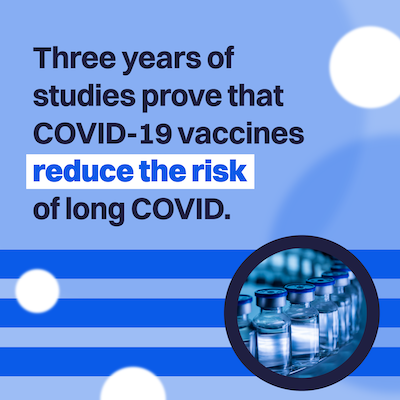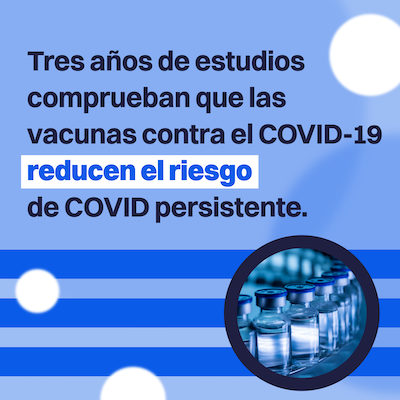Narratives falsely link COVID-19 vaccines to serious diseases
Welcome to the Health Care Infodemiology Brief, a newsletter for clinicians and other health care providers.
As much of the world’s attention shifts from COVID-19 to other public health concerns, some trending narratives are attempting to link COVID-19 vaccines to unrelated public health news. In the last month, vaccine skeptics have falsely claimed that COVID-19 vaccines cause everything from long COVID and AIDS to rising cancer and cardiovascular disease rates that predate the vaccine by a decade. Meanwhile, news coverage of a global health event aimed at preparing for future pandemics set off a firestorm of anti-vaccine and anti-science conspiracy theories about “Disease X.”
For even more resources, check out the menu above for real-time insights, training resources, and more. Specifically curated for doctors and other health care providers, these links provide actionable content to help navigate today’s information landscape.
Trending narratives from the past month
COVID-19 vaccines falsely linked to long COVID and HIV
A news article about research showing that COVID-19 vaccination significantly reduces the risk of long COVID caused outrage in anti-vaccine spaces. Some argued that the article is false, claiming that long COVID is a COVID-19 vaccine side effect. The false claim evolved to speculation that long COVID is actually a COVID-19 vaccine injury called vaccine AIDS, or “VAIDS.” Conspiracists also resurfaced the debunked myth that COVID-19 vaccination can cause positive HIV tests, alleging that the tests are evidence that the vaccines weaken the immune system. Read the fact checks here and here.
COVID-19 vaccines falsely linked to pre-pandemic disease trends
A narrative that falsely links a continuation of pre-pandemic disease trends to COVID-19 vaccines is circulating. Two recent reports, one by the American Cancer Society, found rising cancer rates in younger adults. A third report tracks the rise in excess deaths in the U.K., fueled primarily by rising cardiovascular disease deaths. Several viral posts falsely claim that COVID-19 vaccines are responsible for the rise in excess deaths in the U.K. that began more than a decade before the vaccine existed. Read the fact checks here and here.
Conspiracies circulate about Disease X event
A World Economic Forum meeting about global preparedness for Disease X caused some popular conspiracy theorists to speculate that the event is part of a plan to launch a disease more deadly than COVID-19. Social media posts express distrust of the World Health Organization, and some users claim that Disease X was created to force new vaccines on the public. Online conversations about the Disease X preparedness event have descended into conspiracy theories that a new deadly virus will be intentionally leaked in the next year or two. Read the fact check here.
What you might say in response
Research shows that COVID-19 vaccines reduce long COVID risk and don’t impair the immune system.
- For over three years, scientific studies have consistently shown that COVID-19 vaccination reduces long COVID risk. There is no evidence that COVID-19 vaccines are associated with long COVID.
- “VAIDS” is an anti-vaccine myth. COVID-19 vaccines do not weaken the immune system; they strengthen its ability to fight COVID-19.
- The false claim that COVID-19 vaccines cause positive HIV tests is a misrepresentation of a failed trial for a COVID-19 vaccine containing an HIV protein. However, research suggests that a COVID-19 infection can trigger false-positive HIV tests.
COVID-19 vaccines are not linked to a rise in cancer, cardiovascular disease, or other serious diseases.
- We know that rising cancer rates among young adults are unrelated to COVID-19 vaccines because the trend is based on pre-pandemic data. Recent reports merely confirmed that cancer rates have been climbing worldwide for two decades and that the trend is expected to continue without intervention.
- All credible scientific evidence shows that COVID-19 vaccines are not linked to excess cardiovascular deaths. However, COVID-19 infection increases cardiovascular event risk for up to a year, a risk that is decreased by COVID-19 vaccination.
- Excess cardiovascular deaths in the U.K. began rising steadily nearly a decade before the COVID-19 pandemic.
Disease X is about preparing for future pandemics, not orchestrating them.
- Disease X is not a real disease; it is a term used in epidemiology to refer to potential future disease threats. The concept is neither new nor sinister.
- Pandemic preparedness helps ensure that countries are better equipped to detect, prevent, and respond to these outbreaks and potentially prevent them from spreading beyond their borders. Future pandemics are inevitable and will require global collaboration and preparedness plans.
What we’re reading
- NY Times: My Patients Used to Be Enthusiastic About the Covid Vaccine. What Changed?
- KFF Health News: How Fringe Anti-Science Views Infiltrated Mainstream Politics — And What It Means in 2024
- Scientific American: Disinformation Is the Real Threat to Democracy and Public Health
- AP News: AI-powered misinformation is the world’s biggest short-term threat, Davos report says
Studies and trainings
- The BMJ: Behavioural interventions to reduce vaccine hesitancy driven by misinformation on social media
Interested in learning more about how to debunk false claims with patients? Check out the new Infodemiology Training Program. In videos that range from 5 to 10 minutes each, the program introduces health care providers to the basics of infodemiology and provides you with actionable skills to help improve patient care. Get started today.
Quick-response media assets
Below, we’ve provided a social media asset in English and Spanish. These assets can be used on social media to fight false claims and help provide your network with accurate information. Just click on the share button, and it will pop up in a new window. Then right-click the asset to download.

Proposed caption copy:
Long COVID affects millions worldwide, including around 6 percent of adults in the U.S. Each COVID-19 infection increases your risk of developing long COVID. Fortunately, vaccination dramatically decreases long COVID risk—by nearly 70 percent, according to the latest research. Protection against long COVID is just one more reason to stay up to date on COVID-19 vaccinations.

Publicación propuesta:
El COVID persistente afecta a millones de personas alrededor del mundo cada año, incluidos alrededor del 6 por ciento de los adultos en EE.UU. Cada infección de COVID-19 aumenta tu riesgo de desarrollar COVID persistente. Afortunadamente, vacunarte reduce de forma dramática tu riesgo de COVID persistente –en casi un 70 por ciento, según la investigación más reciente. Protegerte contra el COVID persistente es solo una razón más para mantenerte al día con la vacunación contra el COVID-19.
Powered by PGP in partnership with the ABIM Foundation.
